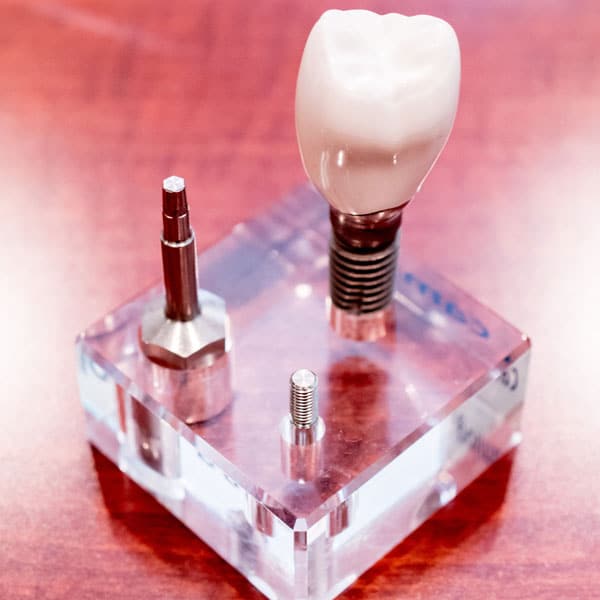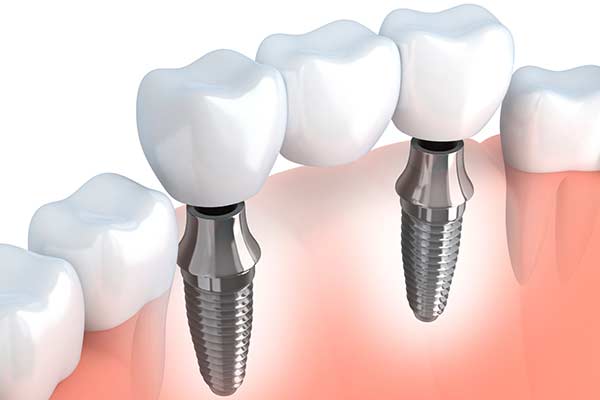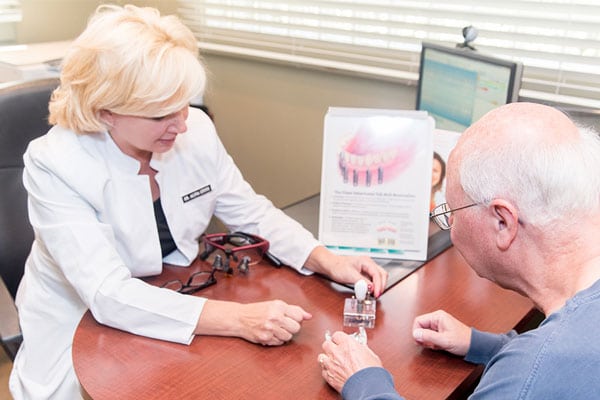What are dental implants and how do they work?
Hi, I'm Dr. Alina Lyons from Lyons Family Dentistry. I get a lot of questions about how to replace a missing tooth with some permanent solution. And yes, you should replace the missing tooth. The reason is when we have a bone, the bone has to have a purpose. If you have a tooth, the bone grows around the tooth. If you have an implant, the bone will grow around the implant. If you don't, the bone loses its purpose and starts melting. So, the implant solution is fantastic. First, you have to be evaluated by a dentist with x-rays, with a cone beam, to see if you have enough of a bone and if it's dense enough. The first stage of the surgery is placing the titanium root, the implant, in the bone. That's the surgical part. People are afraid that it's going to be painful, but it's actually a very simple procedure. You need some numbness, but if you have a root canal, this is definitely less involved than a root canal treatment. So we place an implant, then we wait about three to four months for the implant to be integrated into the bone. After three or four months, if it's assessed that it's ready, then we start the restorative procedure. The restorative procedure takes two to three weeks. We place the foundation, and after the foundation, we place the crown. Then you have a permanently restored tooth.
How do you take care of it?
Just like regular teeth. Routine checkups, flossing, brushing. If you maintain good oral hygiene and the implant is integrated, it will last you for a lifetime.
What is the process for a single restoration of a tooth?
You need to have an assessment first from a dentist. We need x-rays, a cone beam, and to check out the density of your bone. Then, if you are assessed as a good candidate, the surgical part starts. In the surgical part, we put the titanium root, which is the body of the implant, into the bone. After the surgery, which is not that much involved, if you had a root canal, this is actually less involved than a root canal treatment. When you have an implant, we have to wait about three to four months to make sure that the bone integrates with the implant body. After three or four months, if it's stable and good, then we start the restorative procedure. The restorative procedure involves putting a foundation into this root and the crown. This procedure takes about two to three weeks and you have a permanent solution. You have your implant.
How do you take care of this implant?
You just have to have regular checkups, flossing, and brushing, just like your other teeth. If you maintain good oral hygiene, this tooth is going to last you a lifetime. Call us at (609) 298-8309.
What is an implant?
An implant is basically a dental procedure where you replace the missing tooth with an implant. When you have a missing tooth, if you don't replace it, it can cause various problems. It's like a domino effect for other teeth. The teeth start shifting, the bite can change, and you should replace the missing tooth. The minimum option is with a removable partial. We take your impression, send it to the lab, and get the partial which looks like you replaced the missing tooth. Function-wise, it's better than nothing, but the connections holding the partial can rot the other teeth, causing further problems. This is one option.
The second option would be a bridge, which is fixed. Fixed means you cannot take it out. To do this, we need to modify the neighboring teeth. If they are healthy, we hesitate to reduce them, but if there's no other option, we proceed. We take impressions, send them to the lab, and they create a bridge. The bridge is then permanently cemented. It looks beautiful but is difficult to clean. It is better than a removable partial but still has some drawbacks. In both situations, the partial or bridge doesn't involve the bone, leading to bone loss over time since the bone lacks purpose without a tooth or implant.
An implant is like an interior design tooth with two components. The first component is a new root placed in the bone. We monitor it with x-rays for about three to four months to ensure the bone grows nicely into the implant, achieving stability. The second component is an abutment, secured with screws, providing a foundation for the implant crown. This results in the strongest tooth in your mouth.
Implants can help older patients, especially those who have lost teeth prematurely. Upper dentures usually stay in place, but lower dentures often move and are not good for function. Placing implants in the lower arch allows the denture to click into place, making it stable and functional for chewing and eating.
Implants do not decay, but poor oral hygiene can lead to tissue and bone infections, affecting the implant. With regular visits and good oral hygiene, implants should be the strongest tooth and last a lifetime.
The cost depends on the patient and the situation. At Lyons Family Dentistry, we offer a free consultation with x-rays. We can examine you and determine if you need an implant. The most expensive implant is the one you don't need. Call us for a consultation or any questions at (609) 298-8309.

Implants are the best solution for simulating the look, feel, and function of natural teeth. Dental implants do much more than replace missing teeth. They help maintain and strengthen bone structure, provide the ability to chew healthy food, and give patients the confidence to smile. They also protect existing teeth by helping to preserve bone structure.
Once a tooth is lost, several things begin to happen that are not immediately noticeable to a patient and which can have a significant negative effect on both health and appearance. Tooth roots help hold teeth in place, but they are also critical in maintaining health in the surrounding gums and supporting bone structures. Bone loss in the jawbone is one significant problem that naturally occurs once a tooth is lost. This bone loss can compromise the integrity of neighboring tooth roots and tooth stability, and it is also a large part of what causes the “sunken” look that is seen in people who have lost several or all of their teeth. It is the reason patients who wear dentures find that over time their dentures are harder and harder to fit and keep in place.
Dental implant placement can help generate bone growth in the area around the implant, which not only strengthens the bone and builds support, but can also alleviate the sunken look that can occur with bone loss in the jaw. This process is known as osseointegration and is a significant benefit of implant placement because it can also help prevent future bone loss.
Although having a beautiful smile and the confidence that comes with it are important, there are also important health reasons to have dental implants. Whether replacing one tooth or several, implants are an important solution to restoring and maintaining dental health.

Single Tooth Dental Implants
Dental implants replace tooth roots in the mouth. Implants provide a strong foundation for fixed or removable replacement teeth. Dental implants are small anchors made of a biocompatible metal called titanium and are placed in the jawbone. The anchors begin to fuse with the bone over the course of a few months in a process called osseointegration. After the fusing process, abutment posts are inserted into the anchors. A crown can then be attached to the abutment post.

Implant Supported Bridges
An implant supported bridge is a restorative solution for spaces where three or more adjacent teeth are missing. This restoration typically requires two implants to support the porcelain bridge. The bridge provides a functional and aesthetic replacement for a patient’s natural teeth.

Implant Supported Dentures
For patients who are missing many or all of their teeth, implant supported dentures may be an alternative to traditional dentures. This solution requires the placement of two or more implants. In order to replace a full arch denture, a minimum of four implants is generally recommended. Eligibility for this solution is dependent upon a number of factors, with jaw bone density being one of the most significant determining factors.
Traditional dentures rely on an acrylic base that sits directly on the gums, held in place by a paste or adhesive. Using implants as supports for dentures allows for a smaller and more comfortable base and less shifting of the prosthesis during use.
Implants can support both full and partial dentures as well as both fixed and removable dentures. If a removable denture is selected, the denture will “snap” on to the implant rather than requiring the use of denture paste or adhesives.

Full Arch with Only Four Implants
This procedure is a unique implant solution that allows patients with a completely edentulous (toothless) upper or lower arch to replace all of the teeth in that arch using only four implants as anchors.
Implant supported dentures are an improvement over traditional dentures, in that chewing, speaking, and smiling all feel more natural. For the upper arch in particular, an implant supported full arch means there is no plate covering the roof of the mouth, so speaking and eating are more natural and comfortable than with a traditional denture.
Instructions Following Implant Surgery/Implant Treatment:
- Some pain, bleeding, swelling, and seeping are normal following oral surgery. Please do not try to view the site by pulling on your lip and do not probe the area with your tongue or fingers. If you experience excessive bleeding or discomfort after 48-72 hours, please call our office immediately.
- You can take ibuprofen or acetaminophen according to the instructions on the label or those provided by our office as needed.
- Swelling around the face, eyes, and surgical site is not uncommon and may become more noticeable two to three days following surgery. Applying a cold compress to the face near the implant site will help minimize swelling. If using an ice pack, please do not apply ice directly to your skin but place a cloth between the ice and your skin at all times. You may apply the cold compress for up to 20 minutes on and at least 20 minutes off as needed. After 36 hours the cold compress will have no further impact on swelling. After this period, the application of moist heat to the sides of the face can help reduce swelling.
- A warm salt water rinse, approximately ½ teaspoon in an eight ounce glass of water, three times a day can be helpful.
- Avoid brushing your teeth near the surgery site but brush and floss the rest of your mouth as instructed by our office.
- For 24 hours following your surgery, do not suck on a straw, brush, rinse, spit, or smoke.
- For the first 24 hours you may experience some cold and heat sensitivity. Avoid hot and spicy foods as well as carbonated and alcoholic beverages.
- Restrict your activities on the day of your surgery. Avoid excessive work or play, and resume normal activity the following day as tolerated.
- After the first day, gently rinse with a warm salt water rinse, approximately one-half teaspoon of salt in an eight ounce glass of water, three times a day.
- During the first few days after surgery restrict your diet to liquids and soft foods such as soups, yogurt, juice, and smoothies.
- Follow any other instructions provided by the office on your visit. Please take all medications as prescribed including your prescribed antibiotics to help prevent infection.
- If you have a denture that overlaps the implant site, please minimize the use of the denture following surgery to allow the site to heal. After the first week, you should be able to gradually increase the amount of time you can wear your denture.
- It is extremely important to keep your follow up appointment(s) so that we can monitor the healing process.
- If pain and swelling are increasing after a few days, please call our office right away.


